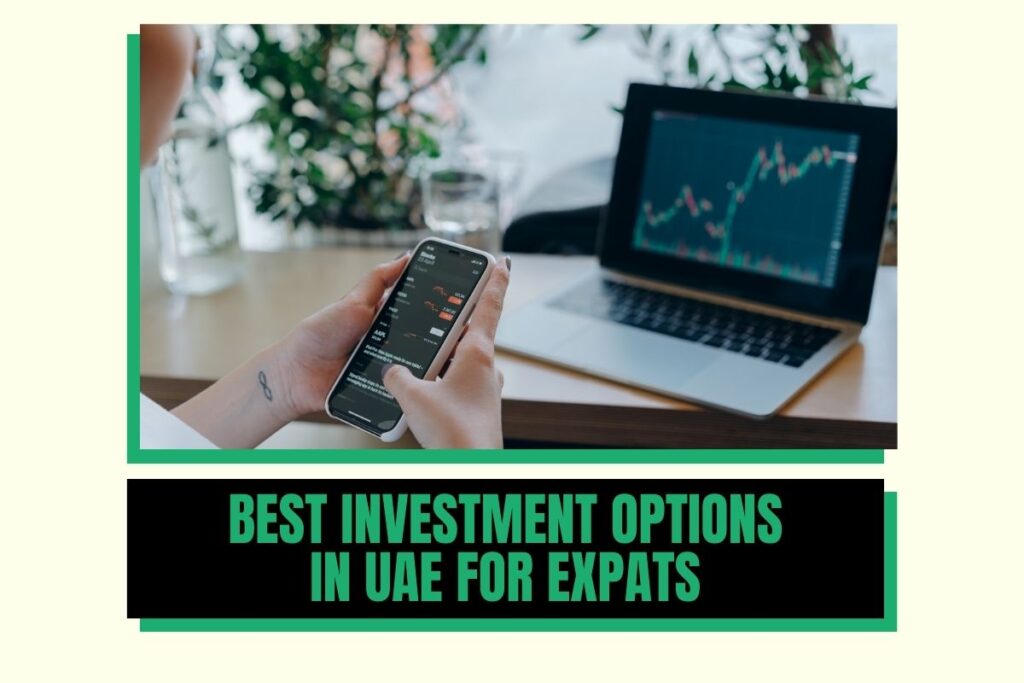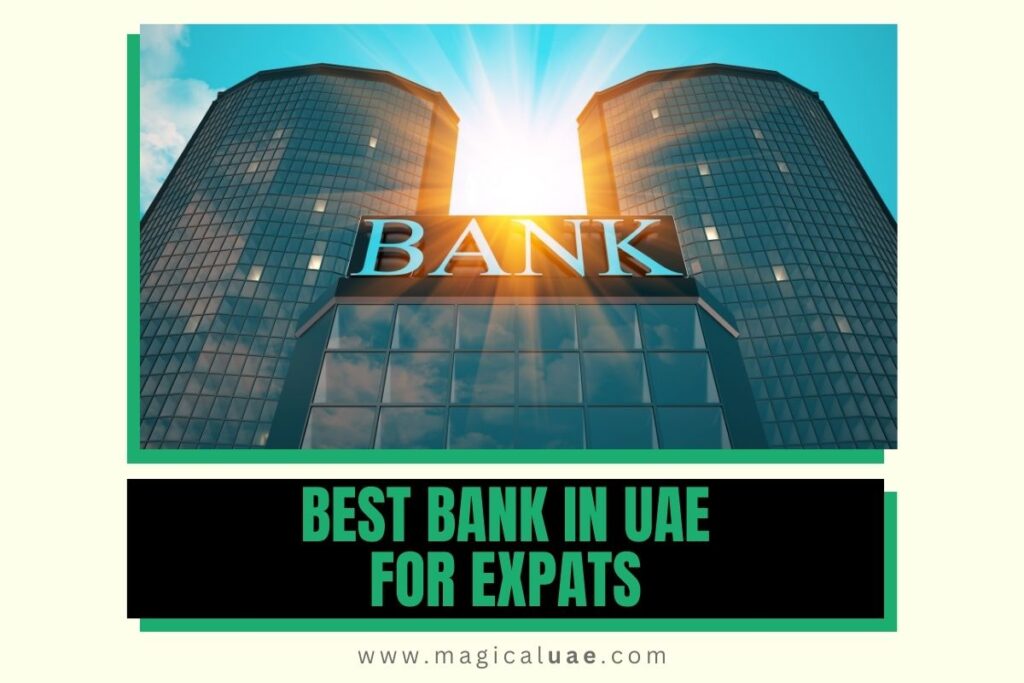Welcome to the dynamic world of investment opportunities in the United Arab Emirates (UAE). For expatriates seeking to make their money work harder in this thriving economy, navigating the diverse options available is key.
In this short guide, we’ll explore the best investment avenues, from real estate to stocks, tailored to suit the unique needs of expats. Join us as we unlock the potential for financial growth in one of the most exciting regions for expatriates worldwide. Let’s make your money work for you in the UAE!
Contents
Real Estate

For expats in the UAE, real estate stands out as one of the best investment options. The booming property market, favorable legal framework, and high rental yields make it an attractive choice. Additionally, the absence of property taxes and a diverse range of properties offer flexibility for investors seeking profitable returns.
Residential Properties
Owning a residential property in the UAE can be a lucrative investment option for expats. The real estate market in the UAE has witnessed a steady growth in recent years, making it an attractive opportunity for those looking to invest.
Whether you are planning to buy a property for yourself or considering it as an investment, the UAE offers a range of options to suit your needs. One of the most popular residential property options in the UAE is apartments. These are available in various sizes and locations, allowing you to choose according to your preferences and budget.
Apartments in prime locations, such as Dubai Marina or Downtown Dubai, offer a luxurious lifestyle and higher rental yields. Villas and townhouses are another popular choice for those who prefer more space and privacy. These are often located in gated communities with amenities like swimming pools, parks, and fitness centers. They are not only ideal for personal use but can also be a great option for long-term investment, as they tend to appreciate in value over time.
Commercial Properties
Investing in commercial properties is another lucrative option in the UAE. With its booming economy and thriving business environment, the demand for office spaces and retail units remains high. Expats can take advantage of this by investing in commercial properties for rental income or starting their own businesses.
Office spaces in central business districts like Dubai International Financial Centre (DIFC) or Abu Dhabi’s Al Maryah Island are highly sought after. These locations offer excellent connectivity, amenities, and attract multinational companies, which ensures a steady demand for office spaces. Retail units in popular shopping malls like Mall of the Emirates or Dubai Mall can also generate good returns on investment.
The UAE is known for its vibrant retail sector and attracts millions of tourists and shoppers every year. Investing in a retail unit allows you to tap into this consumer base and benefit from the retail industry’s growth. In conclusion, investing in real estate, both residential and commercial, is an excellent opportunity for expats in the UAE.
Whether you choose a residential property for personal use or a commercial property for rental income or business purposes, the UAE’s growing real estate market provides a favorable environment for investors. Consider your budget, location preferences, and long-term goals to make an informed decision and maximize your returns.
Stock Maraket

When it comes to investment options in the UAE, the stock market is a popular choice among expats. The stock market allows individuals to invest in a wide range of assets, including individual stocks and exchange-traded funds (ETFs). Understanding these options and their potential benefits is key to making informed investment decisions.
Individual Stocks
Investing in individual stocks involves buying shares of a specific company. This can be an attractive option for expats seeking higher potential returns and who are willing to take on higher risks. Before investing in individual stocks, it is crucial to research and analyze the company’s financial health, performance, and growth prospects.
Some advantages of investing in individual stocks include:
- Potential for high returns: Individual stocks that perform well can provide significant returns on investment.
- Investment control: Investors have the freedom to choose which companies they want to invest in and when to buy or sell their shares.
- Portfolio diversification: By investing in different companies across various sectors, investors can spread their risks and potentially mitigate losses.
However, it’s important to note that investing in individual stocks also has its risks:
- Market volatility: Stock prices can fluctuate significantly, causing the value of investments to rise and fall erratically.
- Individual company risk: Investing in a single company puts all your eggs in one basket. If the company performs poorly or faces financial difficulties, your investment may suffer losses.
Exchange Traded Funds (etfs)
Exchange-traded funds (ETFs) are investment funds that are traded on stock exchanges, similar to individual stocks. ETFs are designed to track the performance of a specific index, sector, commodity, or asset class. They offer diversified exposure to a range of assets, providing investors with an easy and cost-effective way to diversify their portfolios.
Benefits of investing in ETFs include:
- Diversification: ETFs offer exposure to a variety of assets in a single investment, reducing the risk associated with investing in individual stocks.
- Liquidity: ETFs can be bought or sold throughout the trading day, just like individual stocks, making them a convenient investment option.
- Lower costs: Compared to actively managed mutual funds, ETFs often have lower expense ratios, which can lead to higher investment returns over the long term.
However, it’s important to consider the following aspects of investing in ETFs:
- Market volatility: Similar to individual stocks, the value of ETFs can fluctuate, and investors may experience short-term losses.
- Tracking error: ETFs aim to replicate the performance of a specific index, but there may be slight differences between the ETF’s returns and the index it tracks.
- Fees and expenses: While typically lower than mutual funds, ETFs still come with management fees and other expenses that can reduce overall returns.
When considering the stock market as an investment option, it’s essential to evaluate your risk tolerance, financial goals, and time horizon. Consulting with a financial advisor or conducting thorough research can help you make informed decisions and maximize your investment potential.
Fixed Deposits And Savings Accounts
Fixed Deposits and Savings Accounts are among the best investment options in the UAE for expats. They offer a secure way to grow your money with competitive interest rates and flexible tenures, ensuring financial stability and peace of mind.
Fixed deposits and savings accounts are popular choices for expats in the UAE looking to grow their wealth securely. Let’s delve into the details of these investment options.
High-interest Fixed Deposits
In the UAE, expats can benefit from high-interest fixed deposits offered by various banks. By locking in a specific amount of money for a predetermined period, individuals can earn attractive interest rates, often higher than those available on regular savings accounts.
These fixed deposits provide expats with a reliable and secure investment option, which is particularly appealing for those who prefer a predictable and stable return on their investment.
Flexible Savings Accounts
For expats who prefer flexibility, savings accounts offer an excellent option. These accounts typically allow individuals to deposit and withdraw funds as needed, providing a degree of liquidity that fixed deposits do not offer.
Additionally, some banks offer attractive interest rates on savings accounts, making them a useful tool for expats seeking a balance between accessibility and returns. In conclusion, fixed deposits and savings accounts present expats in the UAE with valuable options for growing their wealth securely.
Mutual Funds

When it comes to investment options in the UAE, mutual funds are an excellent choice for expats looking to grow their wealth. Mutual funds offer diversification, professional management, and the potential for higher returns over the long term.
They allow investors to pool their money together and invest in a diversified portfolio of assets such as stocks, bonds, or a combination of both. In this article, we will explore the different types of mutual funds available in the UAE and why they are a popular choice among expatriate investors.
Equity Funds
Equity funds, also known as stock funds, focus on investing in a diversified portfolio of stocks listed on various stock exchanges. These funds offer potential for higher returns, but they also come with higher risk compared to other types of funds.
Equity funds are suited for investors with a higher risk tolerance and a longer investment horizon. By investing in a diversified portfolio of stocks, equity funds allow investors to benefit from the potential growth of different companies and industries. These funds are a popular choice for expats who are looking for long-term capital appreciation.
Bond Funds
Bond funds, also known as fixed-income funds, invest in a variety of fixed-income securities such as government bonds, corporate bonds, and treasury bills. These funds are considered less risky compared to equity funds as they provide a fixed income stream and a relatively stable return. Bond funds are suitable for investors who prioritize preserving their capital and generating a regular income.
Expats who are nearing retirement or looking for a stable investment option often opt for bond funds. These funds offer a lower risk profile while still providing the potential for moderate growth.
Index Funds
Index funds are designed to replicate the performance of a specific market index, such as the S&P 500 or the FTSE 100. These funds aim to provide investors with the same returns as the underlying index, making them a passive investment option. Index funds are relatively low-cost compared to actively managed funds as they do not require extensive research or fund management.
Expats who prefer a hands-off approach to investing and want to track the performance of a specific market index often choose index funds. These funds offer broad market exposure and are a popular choice for those looking to invest in a diversified portfolio with low management fees.
To summarize, mutual funds offer a range of investment choices for expats in the UAE. Equity funds provide the potential for higher returns over the long term, while bond funds offer stability and regular income.
Index funds, on the other hand, provide exposure to a specific market index and are a low-cost investment option. Depending on an individual’s risk tolerance, investment goals, and time horizon, expats can choose the most suitable mutual fund to grow their wealth in the UAE.
Gold And Precious Metals

Investing in gold and other precious metals is a popular choice for expats in the UAE. These timeless assets have long been considered a safe haven for investors looking to diversify their portfolios and protect their wealth.
Physical Gold
One of the most traditional ways to invest in gold is by purchasing physical gold. This can come in the form of gold bars, coins, or jewelry. Owning physical gold allows you to have tangible assets that can be easily stored or kept in a safe deposit box.
Not only does physical gold provide a sense of security, but it also offers the possibility of selling it at a profit if its value increases over time. However, it’s important to note that buying and storing physical gold may incur additional costs such as insurance and security.
Gold Etfs
For those who prefer a more convenient and flexible investment option, gold exchange-traded funds (ETFs) are worth considering. Gold ETFs are investment funds that trade on stock exchanges, representing ownership of gold assets.
Investors can buy and sell shares of the ETFs through their brokerage accounts, providing them with exposure to the price movements of gold without the need to physically own and store the metal. Gold ETFs offer liquidity and transparency, making them a popular choice among expats seeking a hassle-free investment option.
Gold Savings Accounts
If you’re looking to invest in gold but prefer a more conservative approach, gold savings accounts can be a viable option. These accounts allow you to deposit funds with a financial institution that uses the money to purchase and hold gold on your behalf.
The value of your investment is usually linked to the prevailing price of gold. Gold savings accounts provide a convenient way to invest in gold without the need for storage and security concerns that come with physical ownership. However, it’s essential to consider any fees or minimum deposit requirements associated with maintaining a gold savings account.
Factors to Consider When Making an Investment in the UAE
Market Trends: Understanding market trends is critical when making an investment in the UAE or any other market. This includes keeping up to date with economic indicators, such as GDP growth, inflation, and interest rates, as well as analyzing market trends specific to the investment sector, such as real estate market conditions or stock market performance. Market trends can impact the supply and demand of different assets, as well as their overall performance, and should be carefully considered when making investment decisions.
Economic Stability: The stability of the economy is an important factor to consider when making an investment in the UAE or any other market. A stable economy is characterized by steady growth, low inflation, and a stable political and legal environment. The stability of the economy can impact the performance of different investments, as well as overall market conditions. It’s important to research the current economic conditions and future outlook in the UAE before making any investment decisions.
Tax implications: Taxation is an important factor to consider when making an investment in the UAE, as it can impact the overall return on investment. Different types of investments may be subject to different tax rates and regulations, so it’s important to understand the tax implications of each investment before making a decision. Additionally, the UAE has recently introduced new tax regulations, so it’s important to stay up to date with the latest tax laws and changes.
Regulatory Environment: The regulatory environment is also an important factor to consider when making an investment in the UAE. This refers to the laws, regulations, and oversight that govern different types of investments, as well as the institutions responsible for enforcing these regulations. A favorable regulatory environment can provide investor protection, increase transparency, and promote stability in the market. It’s important to research the regulatory environment in the UAE and the specific regulations that apply to the investment you’re considering before making a decision.
How to Choose the Right Investment for Your Portfolio
Evaluate Your Financial Goals and Risk Tolerance: The first step in choosing the right investment for your portfolio is to evaluate your financial goals and risk tolerance. Your financial goals will help determine your investment time horizon and the amount of risk you’re willing to take on.
For example, if you have a long-term investment time horizon and are willing to accept higher levels of risk, you may be more willing to invest in a high-growth stock or real estate project. On the other hand, if you have a short-term investment time horizon and are risk-averse, you may prefer a low-risk investment, such as bonds or a savings account.
Do Your Research and Seek Professional Advice: Once you have a clear understanding of your financial goals and risk tolerance, the next step is to do your research and seek professional advice. This may involve researching different investment options, analyzing market trends, and consulting with a financial advisor or investment professional.
It’s important to thoroughly understand the potential risks and rewards associated with each investment, as well as the specific regulations and tax implications in the UAE.
Diversify Your Portfolio to Minimize Risk: Diversification is a critical aspect of investing and can help minimize risk by spreading your investments across a variety of assets. This means investing in a mix of different assets, such as stocks, bonds, real estate, and commodities, rather than putting all of your money into one investment. Diversification can help reduce the impact of market volatility on your portfolio and increase the potential for long-term growth.
It’s important to regularly review your portfolio and make adjustments as necessary to ensure that you remain diversified and aligned with your financial goals and risk tolerance.
Ultimately, the best investment for your portfolio will depend on your individual financial goals, risk tolerance, and investment time horizon. It’s important to seek professional financial advice and carefully consider the factors discussed above when making investment decisions in the UAE.
Conclusion
Investing in the UAE is a smart choice for expats looking to grow their wealth and secure their financial future. With a strong and diverse investment landscape, the UAE offers many opportunities for growth and potential profits. However, it’s important to consider your financial goals and risk tolerance, do your research, and seek professional advice to make informed investment decisions.




![10 Best Tyre Brands in UAE [2024 Update]](https://magicaluae.com/wp-content/uploads/2024/02/Best-Tyre-Brands-in-UAE-1024x683.jpg)
